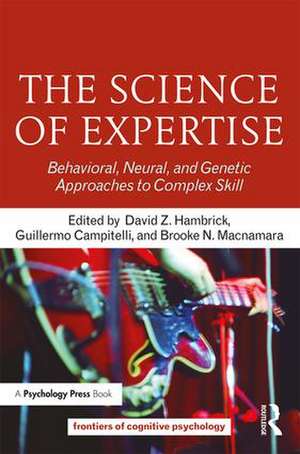The Science of Expertise: Behavioral, Neural, and Genetic Approaches to Complex Skill: Frontiers of Cognitive Psychology
Editat de David Z. Hambrick, Guillermo Campitelli, Brooke N. Macnamaraen Limba Engleză Paperback – 4 oct 2017
| Toate formatele și edițiile | Preț | Express |
|---|---|---|
| Paperback (1) | 484.60 lei 6-8 săpt. | |
| Taylor & Francis – 4 oct 2017 | 484.60 lei 6-8 săpt. | |
| Hardback (1) | 908.78 lei 6-8 săpt. | |
| Taylor & Francis – 28 sep 2017 | 908.78 lei 6-8 săpt. |
Preț: 484.60 lei
Preț vechi: 570.11 lei
-15% Nou
Puncte Express: 727
Preț estimativ în valută:
92.73€ • 97.08$ • 76.73£
92.73€ • 97.08$ • 76.73£
Carte tipărită la comandă
Livrare economică 07-21 aprilie
Preluare comenzi: 021 569.72.76
Specificații
ISBN-13: 9781138204386
ISBN-10: 1138204382
Pagini: 494
Ilustrații: 10 Tables, black and white
Dimensiuni: 152 x 229 x 28 mm
Greutate: 0.79 kg
Ediția:1
Editura: Taylor & Francis
Colecția Routledge
Seria Frontiers of Cognitive Psychology
Locul publicării:Oxford, United Kingdom
ISBN-10: 1138204382
Pagini: 494
Ilustrații: 10 Tables, black and white
Dimensiuni: 152 x 229 x 28 mm
Greutate: 0.79 kg
Ediția:1
Editura: Taylor & Francis
Colecția Routledge
Seria Frontiers of Cognitive Psychology
Locul publicării:Oxford, United Kingdom
Cuprins
Foreword Robert J. Plomin 1. Introduction: A Brief History of the Science of Expertise and Overview of the Book David Z. Hambrick, Brooke N. Macnamara, and Guillermo Campitelli PART 1. BEHAVIORAL 2. Primer – Statistical Methods in the Study of Expertise: Some Key Considerations Samuel T. McAbee and Frederick L. Oswald 3. Cognitive Processes in Chess Guillermo Campitelli4. An Investigation of Problem-Solving Expertise James J. Staszewski 5. How Important Is Intelligence in the Development of Professional Expertise? Combining Prospective and Retrospective Longitudinal Data Provides an Answer Jonathan Wai and Harrison J. Kell 6.The Link Between Child Prodigies and Autism Joanne Ruthsatz, Kimberly Stephens, and Mark Matthews 7.Why Deliberate Practice Is Not Enought: Evidence of Talent in Drawing Jennifer E. Drake and Ellen Winner 8.The Devlopment of Expertise in the Visual Arts Rebecca Chamberlain 9. The Deliberate Practice View: Inconsistent Definitions, Controversial Claims, and Empirical Evidence Brooke N. Macnamara, David Z. Hambrick, David J. Frank, Michael J. King, Alexander P. Burgoyne, and Elizabeth J. Meinz PART 2. NEURAL 10.Primer – Neural Approaches in Research on Expertise Alessandro Guida, Audrey Noël, and Pierre-Yves Jonin 11. The Neural Underpinnings of Expertise in Games Merim Bilalić, Anna Conci, Mario Graf, and Nemaja Vaci 12. The Neural Underpinnings of Perceptual Expertise Mackenzie Sunday and Isabel Gauthier 13. The Neuroscience of Motor Expertise in Real-World Tasks Ellen M. Kok and Anique B. H. de Bruin PART 3. GENETICS 14.Primer--Theoretical Concepts in the Genetics of Expertise Elliot M. Tucker-Drob 15. The Etiology of Reading and Math Expertise: The Western Reserve Reading and Math Project Lee A. Thompson, Carol A. Gross, Susan I. Gross, Sarah Lukowski, and Stephen A. Petrill 16. Genetic Influences on Music Expertise Miriam A. Mosing, Isabelle Peretz, and Fredrik Ullén 17. The Molecular Genetic Basis of Music Ability and Music-Related Phenotypes Yi Ting Tan, Gary E. McPherson, and Sarah J. Wilson PART 4. INTEGRATIVE MODELS 18. Expertise Development from an IMTD Perspective Françoys Gagné 19.Creativity and Expertise: Creators Are Not Equivalent to Domain-Specific Experts! Dean Keith Simonton 20. Computational Models of Expertise Fernand Gobet, Martyn Lloyd-Kelly, and Peter C. R. Lane 21. The Multifactorial Environment Interaction Model (MGIM) of Expert Performance Fredrik Ullén, Miriam A. Mosing, and David Z. Hambrick 22. The Role of Passion in the Development of Expertise: A Conceptual Model Arielle Bonneville-Roussy and Robert J. Vallerand 23. Play During Childhood and the Development of Expertise in Sport Karl Erickson, Jean Côté, Jennifer Turnnidge, Veronica Allan, and Matthew Vierimaa PART 5. PERSPECTIVES 24. Historical--Four Kinds of Expertise Robert J. Sternberg 25. Giftedness--The Relationship Between Expertise and Giftedness: A Talent Development Perspective Rena F. Subotnik, Paula Olszewski-Kubilius, and Frank C. Worrell 26. Skill Acquisition--Experience, Skill Acquisition, and Deliberate Practice Robert W. Proctor 27. Applied and Methodological--Scientific Methodology and Expertise Studies: Massaging the Scar Tissue Robert R. Hoffman
Notă biografică
David Z. Hambrick is professor in the Department of Psychology, Michigan State University, USA. His research on expertise has been widely published in scholarly journals and featured in the mainstream media, including The New York Times, The Boston Globe, and The New Yorker. He received his PhD in experimental psychology from the Georgia Institute of Technology in 2000, and is a Fellow of the Association for Psychological Science.
Guillermo Campitelli is senior lecturer in psychology at Edith Cowan University, Perth, Australia. His research aims to understand individual differences in performance, judgment and decision making, with a particular interest in the cognitive processes underlying expertise. He received this PhD in psychology from the University of Nottingham, UK, in 2003.
Brooke N. Macnamara is assistant professor in the Department of Psychological Sciences at Case Western Reserve University, Cleveland, Ohio, USA. Her diverse research interests include the acquisition of expertise, working memory, and bilingualism. She received her PhD in psychology from Princeton University in 2014.
Guillermo Campitelli is senior lecturer in psychology at Edith Cowan University, Perth, Australia. His research aims to understand individual differences in performance, judgment and decision making, with a particular interest in the cognitive processes underlying expertise. He received this PhD in psychology from the University of Nottingham, UK, in 2003.
Brooke N. Macnamara is assistant professor in the Department of Psychological Sciences at Case Western Reserve University, Cleveland, Ohio, USA. Her diverse research interests include the acquisition of expertise, working memory, and bilingualism. She received her PhD in psychology from Princeton University in 2014.
Descriere
Offering the broadest review of psychological perspectives on human expertise to date, this volume covers behavioral, computational, neural, and genetic approaches to understanding complex skill.









